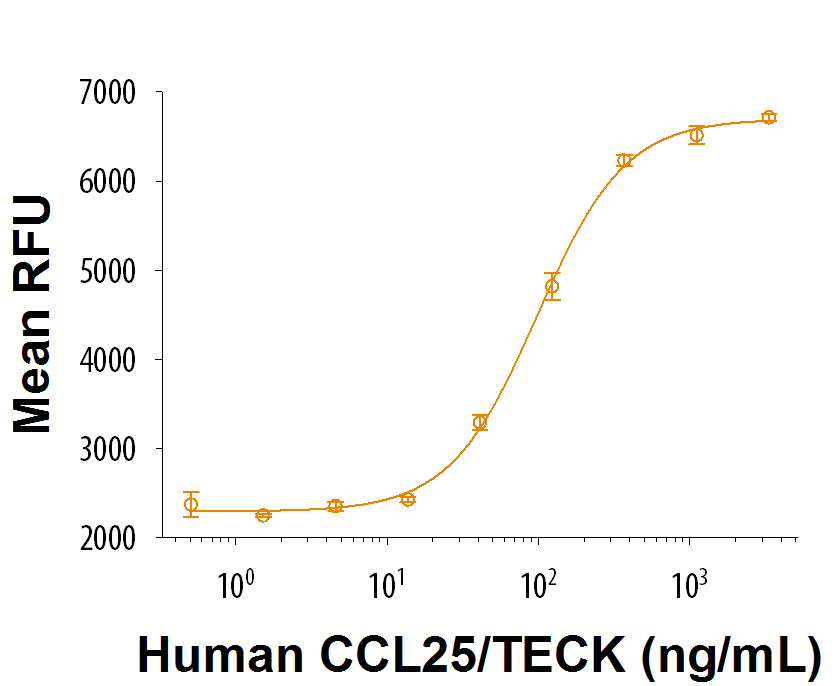Recombinant Human CCL25/TECK Protein Summary
Product Specifications
Gln24-Leu150
Analysis
Product Datasheets
Carrier Free
CF stands for Carrier Free (CF). We typically add Bovine Serum Albumin (BSA) as a carrier protein to our recombinant proteins. Adding a carrier protein enhances protein stability, increases shelf-life, and allows the recombinant protein to be stored at a more dilute concentration. The carrier free version does not contain BSA.
In general, we advise purchasing the recombinant protein with BSA for use in cell or tissue culture, or as an ELISA standard. In contrast, the carrier free protein is recommended for applications, in which the presence of BSA could interfere.
9046-TK
| Formulation | Lyophilized from a 0.2 μm filtered solution in Acetonitrile and TFA with BSA as a carrier protein. |
| Reconstitution | Reconstitute at 250 μg/mL in 4 mM HCl. |
| Shipping | The product is shipped at ambient temperature. Upon receipt, store it immediately at the temperature recommended below. |
| Stability & Storage: | Use a manual defrost freezer and avoid repeated freeze-thaw cycles.
|
9046-TK/CF
| Formulation | Lyophilized from a 0.2 μm filtered solution in Acetonitrile and TFA. |
| Reconstitution | Reconstitute at 250 μg/mL in 4 mM HCl. |
| Shipping | The product is shipped at ambient temperature. Upon receipt, store it immediately at the temperature recommended below. |
| Stability & Storage: | Use a manual defrost freezer and avoid repeated freeze-thaw cycles.
|
Scientific Data
 View Larger
View Larger
Recombinant Human CCL25/TECK (Catalog # 9046-TK) chemoattracts the BaF3 pro-B cells transfected with human CCR9. The ED50 for this effect is 30-180 ng/mL.
Reconstitution Calculator
Background: CCL25/TECK
CCL25, also known as TECK (thymus-expressed chemokine), is a CC chemokine that regulates the trafficking of lymphocytes in the thymus and small intestine. Mature human CCL25 shares 40% amino acid sequence identity with mouse and rat CCL25 (1). CCL25 is produced by stromal cells in the thymus and epithelial cells of the small intestine, particularly the jejunum and ileum (1-3). It binds to and induces chemoattraction through CCR9 (1, 4, 5), and both human and mouse proteins act on human CCR9 (4). CCR9 is expressed on immature pre-T cells and thymocytes (5, 6). CCL25 induces the homing of several lymphocyte populations to the small intestine (3), including Integrin alpha 4 beta 7+ gamma δ T cells (6, 7), Integrin alpha E beta 7+ CD8+ T cells (8), and IgA-producing plasma cells (2). In cancer, functional CCR9 mediates the metastasis of melanoma cells to the small intestine (9), contributes to the CCL25-dependent migration and invasion of some breast carcinomas (10), and attracts mesenchymal stromal cells to CCL25-expressing multiple myelomas (11). CCL25 contributes to the severity of chronic inflammation in rheumatoid arthritis where it attracts CCR9+ monocytes and macrophages (12), in endometriosis where it promotes the invasiveness of stromal cells (13), and in atherosclerosis where it contributes to the accumulation of CCR9+ macrophages in arterial plaques (14).
- Vicari, A.P. et al. (1997) Immunity 7:291.
- Bowman, E.P. et al. (2002) J. Exp. Med. 195:269.
- Kunkel, E.J. et al. (2000) J. Exp. Med. 192:761.
- Zaballos, A. et al. (1999) J. Immunol. 162:5671.
- Youn, B.-S. et al. (1999) Blood 94:2533.
- Uehara, S. et al. (2002) J. Immunol. 168:134.
- Costa, M.F.S. et al. (2012) Eur. J. Immunol. 42:1250.
- Svensson, M. et al. (2002) J. Clin. Invest. 110:1113.
- Amersi, F.F. et al. (2008) Clin. Cancer Res. 14:638.
- Johnson-Holiday, C. et al. (2011) Int. J. Oncol. 38:1279.
- Xu, S. et al. (2012) Stem Cells 30:266.
- Schmutz, C. et al. (2010) Arthritis Res. Ther. 12:R161.
- Wang, Y. et al. (2010) Cell. Mol. Immunol. 7:51.
- Alla, J.A. et al. (2010) J. Biol. Chem. 285:23496.
Citations for Recombinant Human CCL25/TECK Protein
R&D Systems personnel manually curate a database that contains references using R&D Systems products. The data collected includes not only links to publications in PubMed, but also provides information about sample types, species, and experimental conditions.
3
Citations: Showing 1 - 3
Filter your results:
Filter by:
-
CCL25/CCR9 interaction promotes the malignant behavior of salivary adenoid cystic carcinoma via the PI3K/AKT signaling pathway
Authors: S Chai, Z Wen, R Zhang, Y Bai, J Liu, J Li, W Kongling, W Chen, F Wang, L Gao
PeerJ, 2022-08-19;10(0):e13844.
Species: Human, Mouse
Sample Types: In Vivo, Whole Cells
Applications: Bioassay -
A mutation that blocks integrin alpha4beta7 activation prevents adaptive immune-mediated colitis without increasing susceptibility to innate colitis
Authors: H Zhang, Y Zheng, Y Pan, C Lin, S Wang, Z Yan, L Lu, G Ge, J Li, YA Zeng, J Chen
BMC Biol., 2020-06-10;18(1):64.
Species: Human
Sample Types: Whole Cells
Applications: Bioassay -
RAR?/RXR Synergism Potentiates Retinoid Responsiveness in Cutaneous T Cell Lymphoma Cell Lines
Authors: L Wang, SS DeMarco, MS Peaks, AL Maiorana-B, J Chen, MJ Crouch, BM Shewchuk, SR Shaikh, CM Phillips, LC Bridges
Exp. Dermatol., 2017-07-03;0(0):.
Species: Human
Sample Types: Whole Cells
Applications: Bioassay
FAQs
No product specific FAQs exist for this product, however you may
View all Proteins and Enzyme FAQsReviews for Recombinant Human CCL25/TECK Protein
There are currently no reviews for this product. Be the first to review Recombinant Human CCL25/TECK Protein and earn rewards!
Have you used Recombinant Human CCL25/TECK Protein?
Submit a review and receive an Amazon gift card.
$25/€18/£15/$25CAN/¥75 Yuan/¥2500 Yen for a review with an image
$10/€7/£6/$10 CAD/¥70 Yuan/¥1110 Yen for a review without an image

